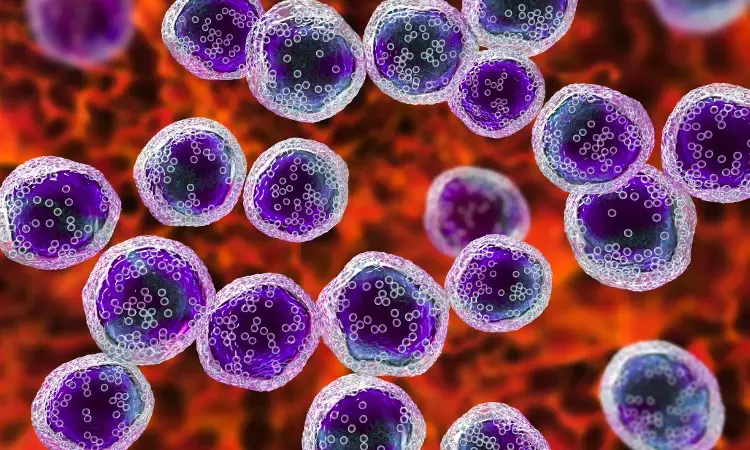- Home
- Medical news & Guidelines
- Anesthesiology
- Cardiology and CTVS
- Critical Care
- Dentistry
- Dermatology
- Diabetes and Endocrinology
- ENT
- Gastroenterology
- Medicine
- Nephrology
- Neurology
- Obstretics-Gynaecology
- Oncology
- Ophthalmology
- Orthopaedics
- Pediatrics-Neonatology
- Psychiatry
- Pulmonology
- Radiology
- Surgery
- Urology
- Laboratory Medicine
- Diet
- Nursing
- Paramedical
- Physiotherapy
- Health news
- Fact Check
- Bone Health Fact Check
- Brain Health Fact Check
- Cancer Related Fact Check
- Child Care Fact Check
- Dental and oral health fact check
- Diabetes and metabolic health fact check
- Diet and Nutrition Fact Check
- Eye and ENT Care Fact Check
- Fitness fact check
- Gut health fact check
- Heart health fact check
- Kidney health fact check
- Medical education fact check
- Men's health fact check
- Respiratory fact check
- Skin and hair care fact check
- Vaccine and Immunization fact check
- Women's health fact check
- AYUSH
- State News
- Andaman and Nicobar Islands
- Andhra Pradesh
- Arunachal Pradesh
- Assam
- Bihar
- Chandigarh
- Chattisgarh
- Dadra and Nagar Haveli
- Daman and Diu
- Delhi
- Goa
- Gujarat
- Haryana
- Himachal Pradesh
- Jammu & Kashmir
- Jharkhand
- Karnataka
- Kerala
- Ladakh
- Lakshadweep
- Madhya Pradesh
- Maharashtra
- Manipur
- Meghalaya
- Mizoram
- Nagaland
- Odisha
- Puducherry
- Punjab
- Rajasthan
- Sikkim
- Tamil Nadu
- Telangana
- Tripura
- Uttar Pradesh
- Uttrakhand
- West Bengal
- Medical Education
- Industry
Ibrutinib with Chemoimmunotherapy Improved Progression-Free Survival of Newly Diagnosed Mantle Cell Lymphoma Patients

Combination chemoimmunotherapy with the Bruton's tyrosine kinase (BTK) inhibitor ibrutinib demonstrated improved progression-free survival over standard chemoimmunotherapy for previously untreated mantle cell lymphoma (MCL) in patients 65 and over, researchers from The University of Texas MD Anderson Cancer Center reported today at the 2022 American Society of Clinical Oncology (ASCO) Annual Meeting. The study results also were published today in the New England Journal of Medicine.
The randomized Phase III SHINE clinical trial was conducted at 183 sites in 28 countries since 2013. The double-blinded study evaluated treatment with bendamustine-rituximab and rituximab maintenance plus either ibrutinib or placebo. The primary endpoint was progression-free survival (PFS) assessed by the investigators.
The median PFS was 80.6 months with the ibrutinib combination versus 52.9 months in the control arm. The complete response rate was 65.5% in the ibrutinib arm and 57.6% in the placebo arm. Median overall survival had not been reached in either treatment arm at the time of data cutoff.
"The majority of mantle cell lymphoma patients who are diagnosed over age 65 are not able to receive intensive chemotherapy or stem cell transplantation due to the excessive toxicities from treatment," said Michael Wang, M.D., professor of Lymphoma and Myeloma and lead investigator of the study. "These results provide evidence that an ibrutinib-based combination front-line treatment regimen provides a significant progression-free survival benefit and may be a new treatment opportunity for this patient population who previously had few options."
MCL is a rare and incurable subtype of B-cell lymphoma, accounting for 7% of all non-Hodgkin lymphoma cases. Single agent ibrutinib has transformed the care of patients with relapsed or refractory MCL with durable activity, particularly when used at first relapse, but patients inevitably develop resistance, generally within one to two years. Ibrutinib received accelerated approval from the U.S. Food & Drug Administration to treat MCL patients who have previously received at least one line of therapy.
The SHINE study randomized 523 patients to the two treatment arms. Median age was 71 years, 65.6% of patients had low or intermediate prognostic risk factors on the mantle cell lymphoma international prognostic index (MIPI), and 8.6% had blastoid/pleiomorphic histology. Patients could not have received prior therapies for their disease. Trial participants were representative of the racial breakdown of patients with newly diagnosed MCL, where majority were white (77%).
Ibrutinib treatment was administered during induction and during rituximab maintenance for two years, continuing indefinitely until disease progression or intolerance. Fifty-two (19.9%) and 106 (40.5%) patients received subsequent anti-lymphoma therapy in the ibrutinib and placebo arms, respectively, while 41 of 106 (38.7%) received a second-line BTK inhibitor in the placebo arm.
Grade 3 or 4 treatment-related adverse events occurred in 81.5% of patients in the ibrutinib group and 77.3% in the placebo group. Atrial fibrillation was reported in 13.9% of patients in the ibrutinib arm and 6.5% of patients who received the placebo. The safety profile was consistent with the known profiles of the individual drug, and patients rated their health-related quality of life similarly across both treatment arms.
"This study shows that the ibrutinib combination significantly improved progression-free survival with manageable toxicities," Wang said. "I am encouraged that moving ibrutinib to the front-line setting will improve outcomes in these patients and should change the standard of care for elderly patients with mantle cell lymphoma."
The patients in this study continue to be followed to evaluate differences in overall survival between treatment arms. Future research may investigate chemotherapy-free or time-limited ibrutinib combinations.
Reference:
Ibrutinib plus Bendamustine and Rituximab in Untreated Mantle-Cell Lymphoma Michael L. Wang, M.D., Wojciech Jurczak, M.D., Ph.D., Mats Jerkeman, M.D., Ph.D., Judith Trotman, F.R.A.C.P., Pier L. Zinzani, M.D., Ph.D., David Belada, M.D., Ph.D., Carola Boccomini, M.D., Ian W. Flinn, M.D., Ph.D., Pratyush Giri, F.R.A.C.P., Andre Goy, M.D., Paul A. Hamlin, M.D.
Dr Kamal Kant Kohli-MBBS, DTCD- a chest specialist with more than 30 years of practice and a flair for writing clinical articles, Dr Kamal Kant Kohli joined Medical Dialogues as a Chief Editor of Medical News. Besides writing articles, as an editor, he proofreads and verifies all the medical content published on Medical Dialogues including those coming from journals, studies,medical conferences,guidelines etc. Email: drkohli@medicaldialogues.in. Contact no. 011-43720751


